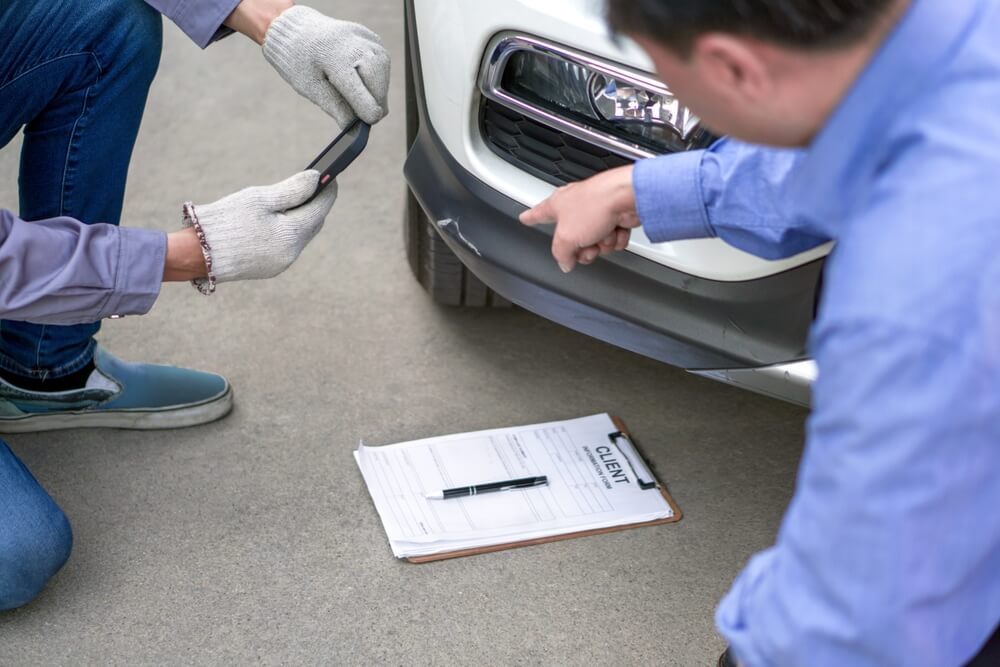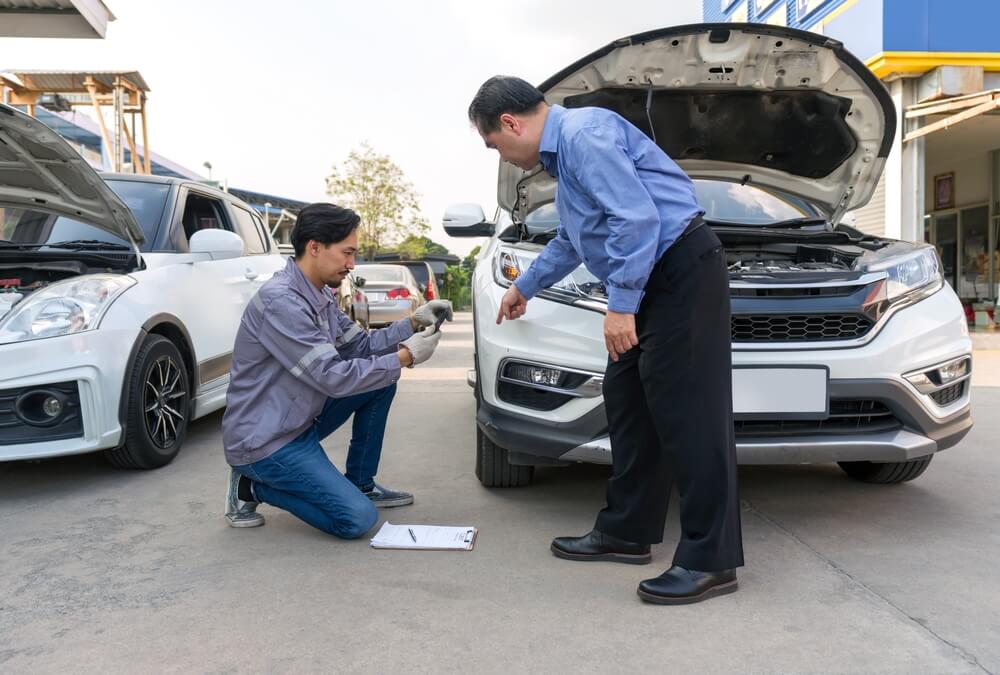Worried about paying for rental car damages in Thailand? Many travellers face costs from minor accidents, scratches, or even cracked windscreens. This guide shows you common issues and simple tips to avoid them.
Stay ahead and drive with peace of mind.
Common Types of Rental Car Damages in Thailand
Rental cars in Thailand can suffer various damages. Common issues include scratches, dents, and tyre damage.
Scratches and dents
Scratches and dents are the most common rental car damages in Thailand. Narrow roads, tight parking spaces, and busy traffic in cities like Bangkok increase risk. Many drivers misjudge distances or get too close to other vehicles or walls when parking.
Small impacts with scooters or minor road debris also cause problems.
Always inspect the vehicle for scratches before leaving the lot. Take photos of all marks and include them in your damage inspection report to avoid disputes later. Use safe parking areas whenever possible and follow local driving regulations to lower risks.
Most car insurance coverage does not cover every scratch if you cannot prove it was there before your trip started; this can lead to extra charges on your rental agreement.
Tyre and wheel damage
Tyre and wheel damage often happens on rough roads or if you hit potholes, which are common in parts of Thailand. Driving off paved roads can lead to flat tyres, punctures, or bent wheels.
These damages usually are not covered by basic car rental insurance. Some companies include tyre cover with a Super Collision Damage Waiver (SCDW), but always check your rental agreement for details.
Parking near kerbs or tight spaces may scratch the wheels. Inspect the condition of all tyres before driving away. Take pictures as proof for your vehicle inspection report. Only drive on approved roads listed in the rental policy to avoid disputes about excluded damages later.
Use proper air pressure in every tyre as low pressure can cause blowouts or more wear during your trip around Thailand.
Windshield cracks
Windshield cracks often happen because of flying rocks or debris, especially on highways and rural roads in Thailand. Sudden temperature changes from air conditioning can also make small chips turn into bigger cracks.
Many rental car insurance policies do not cover glass damage unless you pay extra for Super Collision Damage Waiver (SCDW). Some companies may charge high fees for full replacement if the crack spreads.
Check the windshield closely before renting and take clear photos as proof of its condition.
Let us now look at common problems with interior damage in rental cars.
Interior damage
Broken windows are easy to spot; inside the car, damage can be less obvious. Stains on the seats, cigarette burns, broken controls, or torn fabric often count as chargeable vehicle damages in many rental agreements.
Eating and drinking in the car may seem harmless but will lead to spills and marks that might not come out. Using sharp objects or luggage carelessly can scratch plastics or interiors.
Many rental companies in Thailand check for interior damage during vehicle inspection before returning your deposit. Always inspect and report any existing issues at pickup to avoid disputes about responsibility later.

Understanding Rental Insurance Coverage
Understanding rental insurance coverage is key to protecting yourself from unexpected costs. Many options exist, each with different benefits and limits. Knowing what your insurance covers can save you money and stress.
Read on to learn more about how insurance can help during your trip in Thailand.
Collision Damage Waiver (CDW)
Collision Damage Waiver (CDW) protects you from paying full costs if the rental car gets damaged. It covers most damages to the car body in case of an accident or theft. However, it usually does not cover interior damage or tyre problems.
Always check what is included in your CDW before renting a car. Some companies offer extra coverage for higher protection. Understanding these terms can help avoid rental car disputes later on.
Next, let’s look at Super Collision Damage Waiver (SCDW).
Super Collision Damage Waiver (SCDW)
Super Collision Damage Waiver (SCDW) offers extra protection for rental cars. It lowers the amount you pay if the car gets damaged or stolen. With SCDW, your financial responsibility is lessened compared to basic coverage.
Many rental companies in Thailand offer SCDW as an option. This means you could save money on repairs after an accident. Be sure to read the rental agreement carefully. Some exclusions apply, so know what is covered and what is not before driving away.
Exclusions to be aware of
Some rental insurance policies have exclusions. These can leave you liable for certain damages. Common exclusions include driving under the influence, off-road driving, or not following local traffic laws.
Damage from natural disasters may also not be covered.
Check your rental agreement carefully. Some companies exclude damage to tyres and windscreens despite coverage for other areas of the car. Always ask questions if you’re unsure about what is included in your insurance coverage before renting a vehicle in Thailand.
Tips to Avoid Rental Car Damages
Check the car before you drive away. Look for any scratches or dents and report them to the rental company. Stay on marked roads to avoid damage from rough terrain. Always park in safe, well-lit areas to protect your vehicle.
Inspect the car thoroughly before renting
Look over the car closely before you rent it. Check the exterior for scratches and dents. Note any damage on your rental agreement. This helps to avoid disputes later.
Inspect the tyres and wheels too. Look for signs of wear or punctures. Don’t forget to check the interior as well, including seats and dashboard controls. A careful inspection can save you from paying extra charges later on.
Next, be aware of driving regulations in Thailand to stay safe on the road.
Avoid driving on unapproved roads
Driving on unapproved roads can lead to serious issues. These paths often lack proper maintenance. This increases the risk of damage to your rental car.
Insurance may not cover damages from these routes. Always stick to marked roads and highways. Check with your rental company about allowed routes before you start driving. Stay safe and protect your wallet by avoiding risky areas.
Park in safe locations
Choose safe parking spots. Look for well-lit areas with good visibility. Avoid dark or isolated places where theft can happen. If possible, park in secure lots or garages. Always lock the car and close all windows before leaving.
This simple step can stop damage and keep your belongings safe while enjoying Thailand travel tips.
Rental Car Damages In Thailand
Rental cars in Thailand can get damaged easily. Common issues include scratches, tyre damage, and interior wear. To prevent problems, inspect the car before you drive off. Always park safely and avoid bad roads.
Understanding your insurance options helps too. Stay alert and enjoy your travels!
When you need to rent a car in Thailand, SPS Car Hire Pattaya is a natural choice. Please click on the button below for more details.


